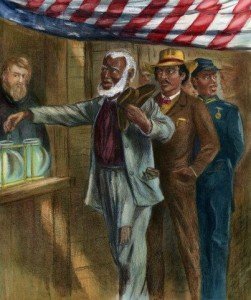 In 1846, New York voters rejected equal voting rights for black males by a wide margin —- 71% to 29%.
In 1846, New York voters rejected equal voting rights for black males by a wide margin —- 71% to 29%.
This rejection helped persuade Gerrit Smith to start his Timbuctoo colony in the Adirondacks. His idea was to get free blacks land enough to meet the $250 property requirement. (All property requirements were abolished for white males.)
Meanwhile, voters in some parts of New York did support equal voting rights, and voted to end the property requirement that kept more than 90% of free black men from voting.
The North Country showed the strongest support.
Clinton County was the county most in favor of black voting rights was Clinton County, where 73% of voters in 1846 said “Yes” to ending that property restriction.
Number two on the list was Essex County, which became the home of Timbuctoo, with 71%.
Washington, Franklin, and Warren counties were also among the only 10 counties voting contrary to the statewide sentiment.
Twice more – in 1860 and 1869 – New York voters statewide said “no” to ending the property qualification for blacks. Only passage of the 15th Amendment to the U.S. Constitution in 1870 finally ended that particular discrimination, although the majority of Essex and Franklin county voters supported equal suffrage throughout.
Illustration: “The First Vote,” by A.R. Waud, 1867.
Although I knew that land ownership was a requirement that prevented many Black New Yorkers from being able to vote, I did not know about the counties that wanted to do away with this requirement. Thank you for making me aware of this. Looking forward to reading more of your posts, in an effort to increase my knowledge about African-American history in New York State.
This is a fascinating post. Does anyone know why the North Country would show such strong support for equal voting rights for Black males at that time? I think that most New Yorkers today would be surprised by that fact…
I look forward to hearing more about this.